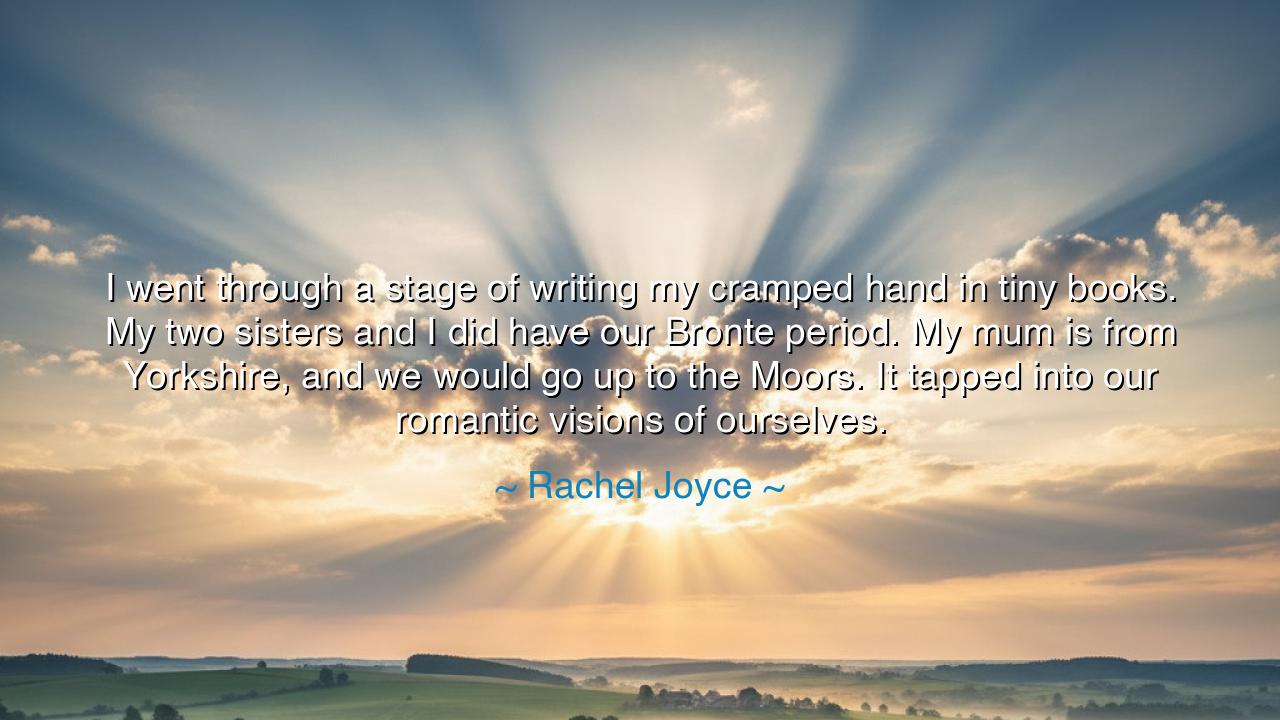
I went through a stage of writing my cramped hand in tiny books.
I went through a stage of writing my cramped hand in tiny books. My two sisters and I did have our Bronte period. My mum is from Yorkshire, and we would go up to the Moors. It tapped into our romantic visions of ourselves.






The words of Rachel Joyce—“I went through a stage of writing my cramped hand in tiny books. My two sisters and I did have our Brontë period. My mum is from Yorkshire, and we would go up to the Moors. It tapped into our romantic visions of ourselves”—are not merely a memory of childhood play, but a glimpse into the eternal hunger of the human spirit for story, for imagination, for self-transformation. In these words, she ties her own youthful longings to the Romantic tradition, to the Brontë sisters who themselves once wrote in tiny books, pouring their hearts into stories that would one day shape the world.
The origin of this quote is rooted in the power of environment and inheritance. To grow up near the Yorkshire Moors is to dwell in a landscape already charged with meaning: windswept, lonely, haunting, a place where nature itself whispers of freedom and longing. It was this very landscape that shaped the visions of Charlotte, Emily, and Anne Brontë, who turned its wildness into the backdrop of passion and struggle in Wuthering Heights and Jane Eyre. Joyce and her sisters, playing upon that same soil, entered into a living dialogue with history, carrying forward the tradition of the Brontës not in imitation, but in spirit.
Consider how the Brontë sisters themselves began. In their childhood at Haworth, they filled tiny books with cramped writing, inventing kingdoms and stories to escape the confines of their isolated lives. These imaginative acts were not trivial, but the beginnings of greatness. Their youthful scribbles foreshadowed works that would redefine English literature. Joyce’s memory of her own “cramped hand in tiny books” thus mirrors this same origin—proving that every act of imagination, however small, participates in the eternal flow of human creativity.
What Joyce calls her “romantic visions of ourselves” reveals the power of imagination not merely to tell stories, but to shape identity. The young do not only write or play—they envision who they might become. The Brontës saw themselves in roles larger than life: lovers, wanderers, heroines upon windswept moors. Joyce and her sisters, too, imagined themselves through this lens. To live romantically is not to deny reality, but to heighten it, to draw upon myth and nature to craft a vision of self that aspires toward the extraordinary.
The lesson we must draw is that imagination, especially in youth, is a sacred seed. What may seem like childish scribbles in a tiny notebook may one day blossom into works of endurance and beauty. To enter into romantic visions of oneself is not folly—it is training the soul to see beyond limitation. The Brontës prove it. Joyce herself, through her later novels, proves it again. Every child who dares to imagine, to write, to dream in secret books is already building the foundation of a future self.
Practically, this calls us to honor the act of imaginative play. Encourage it in children. Protect it in ourselves. Do not scorn the dreams that seem impractical, for they may yet form the wellspring of greatness. Visit places that awaken the spirit, as Joyce and her sisters walked upon the Moors, and allow such landscapes to shape your vision. And when you write, draw, or create, do not fear the roughness of beginnings—the cramped hand, the imperfect effort—for in them lies the seed of mastery.
Thus, Joyce’s words are not merely nostalgic, but instructive. They remind us that the imagination of childhood, nourished by environment and tradition, is one of the most powerful forces in human life. The Brontës, born in obscurity, became immortals of literature. Rachel Joyce, shaped by her own Brontë period, grew into a novelist who carries forward that same spirit of romance and vision.
And so, let this truth be passed on: cherish the tiny books, the scribbled dreams, the visions of self born in wild landscapes. For these are not idle fancies—they are the beginnings of destiny, the sparks from which future flames of creation arise. To dream romantically of oneself is to prepare the soul for greatness.






AAdministratorAdministrator
Welcome, honored guests. Please leave a comment, we will respond soon